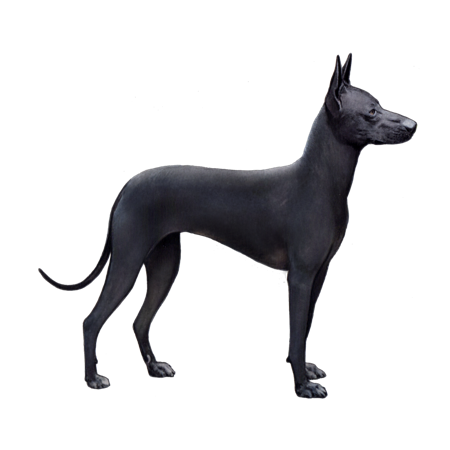
Manchester Terrier
Manchester Terriers are energetic, intelligent, and alert dogs. They're also loyal, loving, and protective of family and territory. Two varieties of the Manchester Terrier exist: the Standard and the Toy. But except for different sizes and ear carriage standards, there are no major distinctions between the two.
Interested in discovering if your dog is a Manchester Terrier?
Check out Wisdom Panel's DNA tests.
Manchester Terrier Traits
General Appearance
A small, black, short-coated dog, the Manchester Terrier has a sleek yet substantial and refined appearance.
Coat and Colouring
The Manchester Terrier is jet black and rich mahogany tan. The tan markings are in similar locations on every Manchester Terrier.
Distinctive Physical Traits
A long and wedge-shaped head and characteristic tan spots above the eyes are distinctive features of Manchester Terriers. The Standard variety can have either naturally erect, cropped, or button ears. Per the breed standard, the Toy variety can have only naturally erect ears.
Manchester Terrier Temperament
Small, clever, and confident dogs, Manchester Terriers can move at great speeds. They have amazing agility skills, too. But they aren't the best lap dogs.
That said, Manchester Terriers are usually affectionate with adults and children. In fact, they often bond quickly with people, demand attention, and enjoy lots of love. With bright and charming personalities, these pups make fine companions for any family. And thanks to their loud bark, they also serve well as watchdogs.
Keep in mind that Manchester Terriers may be wary around strangers, and they sometimes attempt to hunt small animals.
Manchester Terrier History
Hailing from Manchester, England, the Manchester Terrier historically hunted rats and rabbits. During the 19th century, England needed a solution for its massive rat problem. So, John Hulme crossed a Whippet and a dark brown terrier.
The resulting terrier breed was extremely popular among tavern owners who, after closing, would let the dogs roam their taverns to clear out the rats. The breed's supreme skill for this job earned it the nickname "Rat Terrier." The name "Manchester Terrier" didn't arise until the 1860s—when Manchester became the dogs' breeding center.
When Victorian women wanted a smaller companion, breeders created the Toy Manchester Terrier by breeding the smallest Standard Manchesters together.
Registered as separate breeds until 1959, the Standard Manchester and the Toy Manchester are now considered two varieties of the same breed. But the American Kennel Club groups the two varieties separately—the Standard Manchester is part of the terrier group while the Toy belongs to the toy group.
Manchester Terrier Care
Nutrition
Manchester Terriers thrive on a high-quality diet formulated for their age and size. Take care to monitor the amount of food your dog eats, and reduce portions if they gain excess weight. Also, remember that giving too many treats in addition to regular meals can contribute to obesity.
Grooming
Grooming is easy with the Manchester Terrier. Occasional baths and a weekly wipe with a hound glove or damp towel are all that it takes to keep this breed looking its best.
Every couple of weeks, you should also trim your dog's nails to prevent splitting. Likewise, aim to check your Manchester Terrier's ears regularly to avoid a buildup of wax and debris.
Lastly, establishing a good dental hygiene routine will support your dog's overall health. In addition to professional cleanings, regularly brush your pup's teeth at home and consider giving veterinarian-recommended dental chews.
Exercise
Quick and lively, Manchester Terriers are athletic dogs that need daily walks to support their mental and physical well-being.
Though these pups may enjoy life as couch potatoes some of the time, they're usually eager to chase a ball or run in the great outdoors. Manchester Terriers also enjoy dog sports—such as agility, tracking, flyball, and both rally and competitive obedience.
Training
Manchester Terriers are easy to train and eager learners that like to show off their abilities. Your pup's training should start early and be firm (yet gentle) and consistent.
Though Manchester Terriers can be stubborn, they thrive in a reward-based training environment. Treats and favorite toys provide excellent motivation.
All dogs benefit from early socialization, as it helps them be more comfortable around other animals and strangers.
Manchester Terrier Genetic Health Conditions
-
von Willebrand's Disease, type 1
von Willebrand's Disease (vWD) Type 1 is a blood clotting disorder that typically causes mild bleeding tendencies although some affected dogs may have more severe signs. It is the result of low levels of von Willebrand's factor, a blood protein that helps stabilize blood clots.
-
Xanthinuria (Discovered in the Toy Manchester Terrier)
Xanthinuria can cause formation of stones throughout the upper and lower urinary tracts, including the urethra, bladder, ureters, and kidneys. These stones can result in pain, bloody urine, infection and blockage of the urinary tract.
Knowing if your Manchester Terrier is a carrier or at-risk for these conditions can help you and your veterinarian plan for your pup's lifelong care. With Wisdom Panel™ Premium, you can get results for over 200 genetic health tests.
Breed Group
Terrier
The Terrier Group ancestors were bred to hunt and kill vermin. They are often characterized as feisty and energetic dogs whose sizes range from fairly small to much larger.





















































